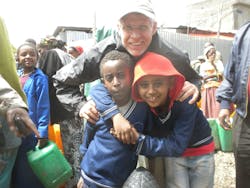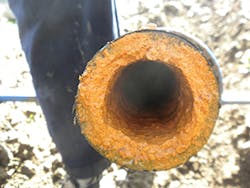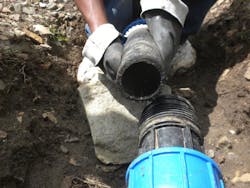U.S. Drilling industry and Christian charities rescue low-flow water well for 15,000 Sendafa, Ethiopia residents
U.S. drilling industry members and two Christian charities donated equipment, supplies and expertise last May to rehabilitate and return a partially-blocked primary water well to full-capacity in Sendafa, Ethiopia. The well and its water is vital to the water quantity, health and well-being of Sendafa's 15,000 residents.
The non-denominational, Living Word Community Church (LWCC), Red Lion, Pa., funded the $45,000 (U.S.) venture, which would have cost upwards of $65,000 without donations of supplies and expertise from the project's drilling industry donors. It was the first environmentally-friendly treatment of a mineral-blocked well in Ethiopia and possibly the first water well rehabilitation project of its kind in Africa, according to Ethiopian officials.
Well rehabilitation included safely dissolving away accumulated mineral solids and iron-eating bacteria adhered to the screen-style water well's, submersible 25-hp pump and the interior of the 330-m (1,082-ft) of HDPE 7.5-cm-diameter (3-in.) pipe. The successful mission increased the well's output from approximately 2-L/s (32-g/m) to 4.7-L/s (74-g/m), which now eliminates residents' long waits to fill water containers, according to John Hilliard, global missions director of LWCC, which adopted the town nine years ago and built the $78,000 water well six years ago to provide more plentiful and safer water.
Jim Honeycutt, volunteer engineer at faith-based safe drinking water charity, Water Missions International (WMI), Charleston, S.C., coordinated LWCC with the U.S. drilling industry's Design Water Technologies--division of Jet-Lube, Houston; and David Powell, president of Aston, Pa.-based drilling contractor Edward Powell Pump & Well and the non-profit charity, Wells For Relief International. Powell, donated full consulting services and Design Water Technologies partially donated its non-corrosive and non-toxic Unicid cleaner provided through the West Columbia, S.C. branch of water/oil drilling wholesaler, Drillers Service, Hickory, S.C. The work was coordinated through the Sendafa Water Supply and Sewerage Enterprise (SWSSE), the local government water authority.
Preparation began in the U.S. with testing and analysis of water and pipe accumulation samples by WMI and Powell, who consulted local drilling contractor, Hydro Construction and Engineering Services Ltd., Addis Ababa, Ethiopia, throughout the project. Hydro Construction supplied a crane, 10-hp. winch, an air compressor, well service accessories and a six-man crew. While the actual site rehabilitation lasted one week, six months of consultation on required paperwork were provided by freight forwarder John S. James Co., Atlanta, Ga., which partially-donated its consultation and communication services. James was integral in helping WMI and SWSSE navigate Ethiopian chemical import/tariff protocol, which was delayed by two separate air shipment mandates and numerous government sign-offs for the importing of chemical products new to Ethiopia.
Solving Accumulations and Challenges
Powell and Honeycutt began site work by renting a 17,000-L (4,490-gal) tanker truck to store water for townspeople during the well's shutdown. After pulling and bathing the pump and its 55-meter-long (180-feet) electrical cable for several days, Powell and Hydro Construction's, Project Head, Kefyalew Tilahun fabricated air lifting diverters and a custom-sized brush to clean the pipe and five sections of six-meter-long (19-feet) well screens. Air lifting the well preceded, an application of 60-L (16-gal) of Unicid acid-forming catalyst mixed with 80-kg (170-lbs) of Unicid granular, a non-corrosive, safe and more environmentally-friendly organic acid alternative to conventional toxic acid treatments. Furthermore, Unicid doesn't contaminate aquifers and a remaining supply of 22-kg (50-lbs) and 19-L (5-gal) will also be applied periodically to prevent future Sendafa pump and piping mineral accumulations. Bi-monthly conventional shock treatments with locally-available chlorination chemicals were also recommended by Honeycutt, a veteran chemical engineer who has volunteered for more than 30 African water drilling or sanitation projects.
The well's increased water volume is part of a long-term plan to enable a recently-built $63,000, 220,000-L (58,219-gal) above ground reservoir to operate at full capacity to provide optimum water sanitizing. Previously the well didn't have the volume to fill the reservoir and 4,000 homes with indoor plumbing. "LWCC also funded the well six years ago, because we discovered a high percentage of Sendafa resident illnesses were drinking water-related, said Hilliard, who's church ministers an array of volunteer services for Sendafa. "We funded the reservoir's construction to further enhance Sendafa residents' health."
Rehabbing the well was not a cakewalk. A deviation that was previously unknown near the 90-meter depth challenged the effort and created the potential of permanently jamming the cleaning brush or surge block inside the well. "The pipe (deviation) initially endangered the project's completion, but we believe persistence, prayer and divine intervention truly created a miracle," said Powell, who has previously donated his well industry expertise to dozens of safe drinking water projects in Ghana the last decade.
"To return a well this challenging and difficult to 100-percent capacity was one of the most satisfying projects of my 35-year drilling industry career--especially when considering the well's importance to Sendafa residents, " said Powell.


